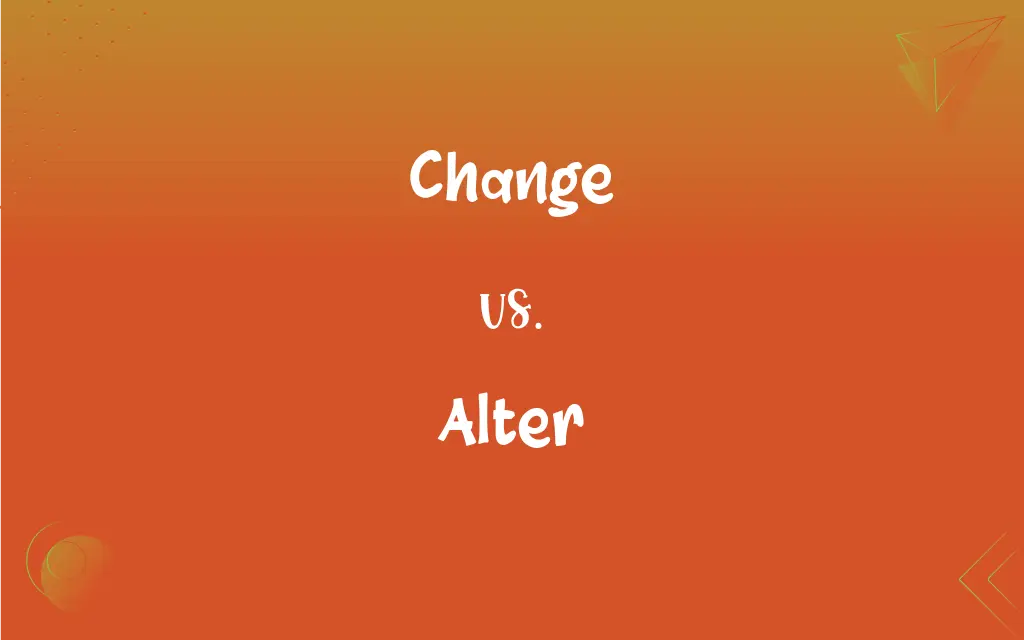Change vs. Alter: What's the Difference?
Edited by Aimie Carlson || By Janet White || Published on January 12, 2024
Change refers to making something different, often fundamentally, while alter suggests modifying something without a drastic shift.

Key Differences
Change implies a fundamental difference in the form, nature, or appearance of something, often leading to a new form or structure. Alter, on the other hand, typically suggests a more subtle modification, adjusting or tweaking something without transforming its essence.
When we change something, it often becomes unrecognizable or significantly different from its original state. Alteration, in contrast, maintains the core identity of the subject but might modify certain aspects to suit different needs or contexts.
Change can refer to a wide range of transformations, from personal development to societal shifts. Alter, however, is usually used in contexts where the modifications are less extensive, such as altering a piece of clothing or slightly modifying a plan.
To change something can sometimes imply replacing it with something else, whereas to alter something suggests that the original item or idea is still present, but in a modified form.
Change is often used in a broader, more conceptual sense, encompassing a wide array of transformations. Alter tends to be more specific and is often used in technical or practical contexts, such as altering measurements or adjusting settings.
ADVERTISEMENT
Comparison Chart
Scope
Broad, fundamental transformation
Subtle, specific modifications
Nature of Transformation
Can be radical, making things unrecognizable
Usually minor, retaining the core essence
Contexts
Personal, societal, conceptual
Technical, practical, specific
Implication of Replacement
Can imply replacing something entirely
Suggests retaining and modifying the original
Usage
Broader, more diverse contexts
More focused, often in specialized fields
ADVERTISEMENT
Change and Alter Definitions
Change
To become different.
The weather can change rapidly.
Alter
To modify slightly.
She decided to alter her wedding dress for a better fit.
Change
To make something different.
He decided to change his career path.
Alter
To tailor or customize something.
The tailor altered the suit to match his measurements.
Change
To replace something with something else.
She changed her shirt after spilling coffee on it.
Alter
To make minor adjustments to an existing structure.
She altered her hairstyle just a bit.
Change
To undergo a transformation.
Caterpillars change into butterflies.
Alter
To adjust or make minor changes.
He altered the settings on his camera.
Change
To switch from one thing to another.
They change the topic of conversation frequently.
Alter
To change in a small but significant way.
The plan was altered due to unforeseen circumstances.
Change
To cause to be different; alter
We decided to change the color of the walls. You can't change the rules in the middle of the game.
Alter
To change or make different; modify
Altered my will.
Alter
To adjust (a garment) for a better fit.
FAQs
Can change be both positive and negative?
Yes, change can be positive, like personal growth, or negative, like a downturn in health.
Can you use change and alter interchangeably?
Not always, as they differ in the extent and nature of the modification.
Is alter more common in certain contexts?
Yes, it's often used in practical, technical, or specific contexts.
Is alter always about small changes?
Generally, yes, alter implies smaller, more specific adjustments.
Is alter used in fashion frequently?
Yes, it's commonly used in tailoring and fashion to refer to adjustments.
Does change always require action?
Change can be both a result of action or natural processes.
Does change imply a complete overhaul?
Often, but not always, change can refer to complete transformations.
Can technology be altered?
Yes, technology can be altered to enhance functionality.
Is change necessary for growth?
Generally, yes, change is often a prerequisite for growth.
Can change be reversible?
Sometimes, but many changes, like growth, are irreversible.
Can alter refer to personality changes?
Rarely, as it usually pertains to more tangible modifications.
Can you alter an opinion?
Yes, opinions can be altered with new information or perspectives.
Can altering something improve it?
Yes, alterations are often made to improve or tailor something.
Is change important in business?
Yes, businesses often need to change to stay competitive.
Does change affect everyone the same way?
No, the impact of change varies greatly among individuals and contexts.
Is change always noticeable?
Often, but some changes are gradual and less apparent.
Are changes in nature always gradual?
Not always, some natural changes can be sudden, like weather shifts.
Can alterations be undone?
Depending on the alteration, some can be undone or revised.
Can altering a plan be beneficial?
Yes, altering plans can adapt to new information or circumstances.
Does change happen only over time?
No, some changes can be immediate, while others take time.
About Author
Written by
Janet WhiteJanet White has been an esteemed writer and blogger for Difference Wiki. Holding a Master's degree in Science and Medical Journalism from the prestigious Boston University, she has consistently demonstrated her expertise and passion for her field. When she's not immersed in her work, Janet relishes her time exercising, delving into a good book, and cherishing moments with friends and family.
Edited by
Aimie CarlsonAimie Carlson, holding a master's degree in English literature, is a fervent English language enthusiast. She lends her writing talents to Difference Wiki, a prominent website that specializes in comparisons, offering readers insightful analyses that both captivate and inform.






































































